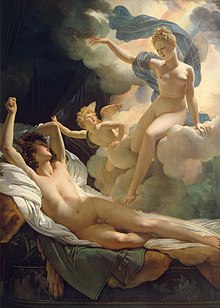Morpheus (mythology)
| Morpheus | |
|---|---|
| God of dreams | |

Morpheus and Iris, by Pierre-Narcisse Guérin
|
|
| Abode | Mount Olympus |
| Consort | None |
| Parents | Hypnos |
| Children | Unknown |
| Roman equivalent | Morpheus |
Morpheus (/ˈmɔːrfiəs/ or /ˈmɔːrfjuːs/) is a god of dreams who appears in Ovid's Metamorphoses.
Morpheus has the ability to mimic any human form and to appear in dreams. His true semblance is that of a winged daemon, an imagery shared with many of his siblings. Robert Burton, in his 1621 Anatomy of Melancholy, refers to Classical depictions of Morpheus, saying "Philostaratus paints [Morpheus] in a white and black coat, with a horn and ivory box full of dreams, of the same colours, to signify good and bad". In myth, Morpheus was also said to send dreams through one of two gates, one of ivory, and the other of horn. Starting in the medieval period, the name Morpheus began to stand generally for the god of dreams or of sleep. In Carl Michael Bellman's Fredman's Epistle No. 72, "Glimmande nymf", Morpheus is invoked as the god of sleep.
The Roman poet Ovid states in his Metamorphoses that Morpheus is a son of Hypnos and reports that he had a thousand siblings, with Morpheus, Phobetor and Phantasos being merely the most prominent among them.
...
Wikipedia
